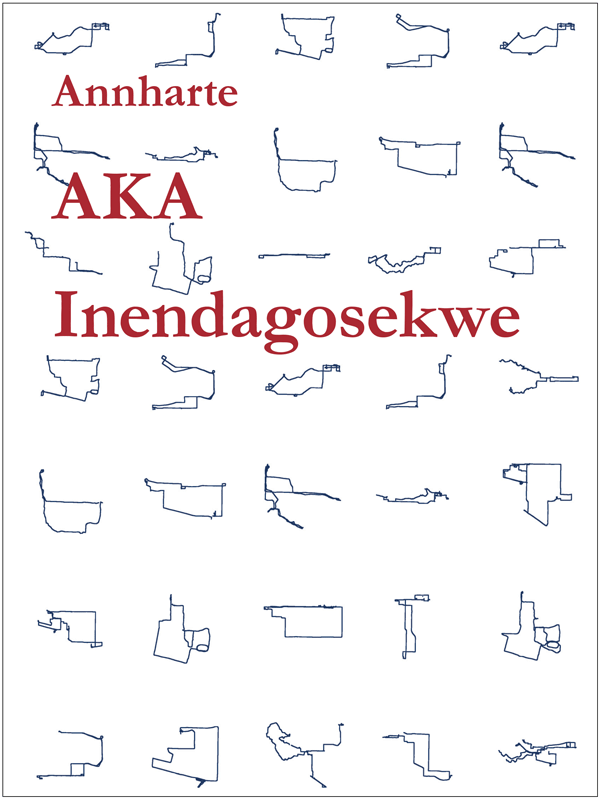Annharte's 'AKA Inendagosekwe'

In her recent collection of essays, edited by Vancouver poet and critic Reg Johanson and collected together as AKA Inendagosekwe (CUE, 2013), Winnipeg poet Annharte’s “Advice to Young Writers” reads:
Don’t listen to your elders…sometimes listen to that coyote voice within you and do something that will both shock and entertain your elders. They like innovation too, not the same boring mainline crap, preaching about Native Culture. We got to decolonize our thinking and that is why experimenting with ideas is needed. Too much of Native Literature is about passively accepting colonization and exploitation. World-wide indigenous writings—the literature of resistance—needs our contribution and attention too.
Anishinable (Little Saskatchewan First Nation, Manitoba) poet, playwright, critic and storyteller Marie Annharte Baker, also known as Annharte, is the author of four poetry collections: indigena awry (New Star Books, 2012), Exercises In Lip Pointing (New Star Books, 2003), Coyote Columbus Café (Moonprint, 1994) and Being On the Moon (Polestar, 1990; Raincoast, 2000). Her collection of essays, AKA Inendagosekwe, is a mix of interviews, essays, artist statements, author biographies, theatre scripts, workshop notes and journal entries composed and published over the past two-plus decades, with a number of pieces in the collection appearing in print for the first time. Through three dozen pieces, Annharte explores the fluid nature of identity and identity politics, while challenging and questioning language, settler presumptions and aboriginal leaderships. Given the fact that a couple of pieces in the collection appear originally composed as author biographies, one could say that the entire collection explores identity. Annharte’s fluidity of form is striking, and the exploration of form is something her critical work shares with her poetry, as she pushes against racism, misunderstandings, stereotypes and just plain ignorance presented to and about natives and native culture, explored through humour, deft play and skill, and the occasional use of brute force. As she writes to open the piece “word triks”:
to be a writer is to be a trickster you play a bunch of tricks on yourself not always on Others
Annharte’s name isn’t included in enough conversations on experimental writing in Canada, which is a serious oversight, and even her use of more straightforwardly-narrative forms are anything but straightforward. In his piece “Straight Forward Approach: Annharte’s Exercises in Lip Pointing” in Antiphonies: Essays on Women’s Experimental Poetries in Canada (The Gig, 2008), Johanson writes:
While Annharte’s language is in fact full of syntactical play and does ignore many of the regulations of the colonizer’s grammar, she has no privileged position to renounce; the exchange-value of her commodity-speech is already devalued, and she feels responsible to a larger community than the one usually addressed by the avant-garde.
There is a history of political poetry in Canada that is arguably much less overt than the histories of political writing in other countries, yet there are colonial attitudes and presumptions that are increasingly being challenged through art, politics and social attitudes. One can look at the histories of writing in Quebec, feminist writing from the 1960s onward, the social politic-poetics of Vancouver writing (focusing, in part, around the Kootenay School of Writing), eco-poetries, the recent stretch of political poetry around federal politics and policies and Roy Kiyooka’s “inglish,” as well as a history of literary resistance by various indigenous writers (I keep hoping someone else might write something exploring any of these, so I might better understand some of these histories). As she writes in the piece “Medicine Lines: The Doctoring of Story and Self”: “I know I am for ‘decolonizing’ the literature be it Canadian or Indigenous.” It would be easy to align Annharte’s writing with a number of other current and former Vancouver-area poets (she returned to Winnipeg only a few years ago, after living many years in Vancouver) engaging with social politics and language writing, including Stephen Collis, nikki reimer, Jeff Derksen, Christine Leclerc, Fred Wah, Roy Miki, Maxine Gadd, Christine Stewart and Aaron Vidaver, but even that would be to oversimplify the powerful effect of her writing. Why are more not listening to (and writing on) the work of Annharte?
Bio: Marie Annharte Baker
“Mixed bag” writer: Ambiguity. What is bag? Medicine bag? Bag might be an affectionate and teasing name for a woman or self. The mix? Definitely, all over the North American map. Mixed genre? For sure. Mixed blood. Moving right along, red corpuscle forward.
Anishinabekwe: Respect for birthmother origins. Little Saskatchewan First Nations, Manitoba. Bill C-31. Grandmother of 2 little girls with Okanagan, Winnebago and Saulteaux connections plus celtic infusion. Kokum but they call me “koo koo.”
Celtic Challenged: Used to claim more “Irish” because my dad was live. Now, he’s gone I am not so picky about naming that identification.
Cyborg: In more harmony with computer than goddess worship. Some Internet Indians are too weird for wired. Will spiderwoman grace future website? Cyberoriginal? Cyberanishinabe? All to the good.
Some notes on Canadian poetry